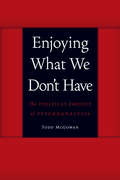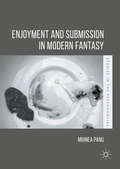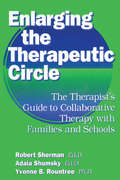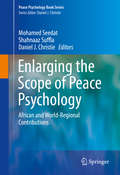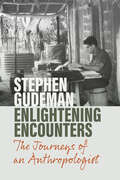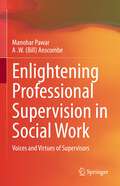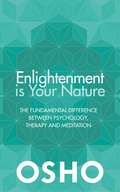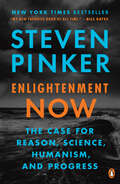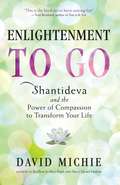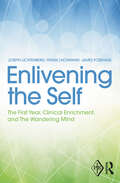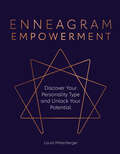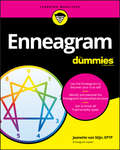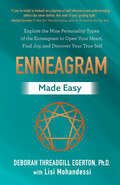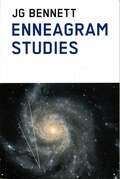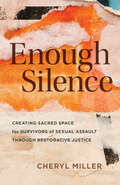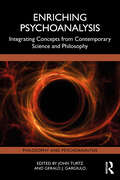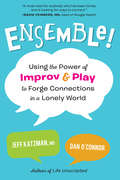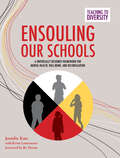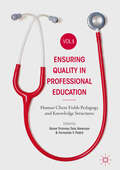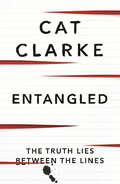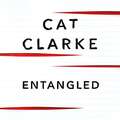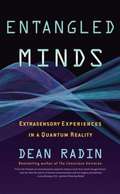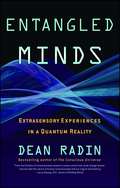- Table View
- List View
Enjoying What We Don't Have: The Political Project of Psychoanalysis (Symploke Studies in Contemporary Theory)
by Todd McGowanAlthough there have been many attempts to apply the ideas of psychoanalysis to political thought, this book is the first to identify the political project inherent in the fundamental tenets of psychoanalysis. And this political project, Todd McGowan contends, provides an avenue for emancipatory politics after the failure of Marxism in the twentieth century.Where others seeking the political import of psychoanalysis have looked to Freud&’s early work on sexuality, McGowan focuses on Freud&’s discovery of the death drive and Jacques Lacan&’s elaboration of this concept. He argues that the self-destruction occurring as a result of the death drive is the foundational act of emancipation around which we should construct our political philosophy. Psychoanalysis offers the possibility for thinking about emancipation not as an act of overcoming loss but as the embrace of loss. It is only through the embrace of loss, McGowan suggests, that we find the path to enjoyment, and enjoyment is the determinative factor in all political struggles—and only in a political project that embraces the centrality of loss will we find a viable alternative to global capitalism.
Enjoyment and Submission in Modern Fantasy
by Mihnea PanuThis book reveals the workings of the bourgeois passion for submission in a variety of contemporary contexts. By (re)introducing the concept 'bourgeois' as an analytical term and describing this contemporary subject as a psychic economy rather than just as a social class, Panu shows the intractability of contemporary forms of enjoyment and neoliberalism's periodic outbursts of aggressiveness to be connected by a recurrent circuit of trauma and anxiety originating in the bourgeois subject's difficult relationship with symbolic authority. So far, most anticapitalist and decolonial struggles in the West have been hesitant when engaging with the issue of bourgeois enjoyment as the main source of capitalism's resilience. This exciting new work draws on an extensive range of theorists such as Butler, Copjec, Žižek and Zupancic to emphasise the importance of psychological mechanisms irreducible to rationality or knowledge such as desire, enjoyment, and the obscure nature of selfhood in the reiteration of the current capitalist reality.
Enlarging The Therapeutic Circle: The Therapist's Guide To Collaborative Therapy With Families & School
by Robert Sherman, Ed.D. Adala Shumsky, Ed.D. Yvonne B. Roundtree, Ph.D.First published in 1995. Routledge is an imprint of Taylor & Francis, an informa company.
Enlarging the Scope of Peace Psychology
by Mohamed Seedat Shahnaaz Suffla Daniel J. ChristieWith the major goal of building an inclusive international community that promotes peace-related research and action, this volume reflects on local, national and global peace engagement and works towards transdisciplinary understandings of the role of psychology in peace, conflict, and violence. Drawn primarily from 14th Biennial International Symposium on the Contributions of Psychology, the chapters focus on peacemaking--or the pursuit of harmony in human relations-- and peacebuilding--or equity in human relations-- with a special emphasis on voices from typically underrepresented areas in psychology, such as the Global South. In order to move beyond a Western-centered idea of peace psychology, the volume is divided into two major parts. The first half of the volume puts an emphasis on peace psychology research and praxis in a number of geohistorical contexts, including Malaysia, Northern Ireland, Thailand, and Kashmir, that bear on conflict, harmony and equity in human relations. Chapters in the second half of the volume fulfill the mandate of Biennial Symposia; namely, to create more equity in the production of peace theory and praxis by bringing forward the voices of scholars and change agents that are often unheard in peace discourses, including a number of scholars and chapters from South Africa. Additionally, throughout the chapters, the authors and editors of the volume emphasize emancipatory agendas as an important alternative to militarism and state-sponsored violence. With the aim of bringing forward voices from cultures and situations that are typically not included or highly visible in peace discourses, Enlarging the Scope of Peace Psychology in Invited and Invented Spaces: African and World-Regional Contributions is a thought-provoking, timely, and informative work. Psychologists, anthropologists, sociologists, political scientists, activists, public-policy makers, and all those interested in promoting peace and justice, are sure to find this an invaluable and illuminating resource.
Enlightening Encounters: The Journeys of an Anthropologist
by Stephen GudemanOne of the world's top anthropologists recounts his formative experiences doing fieldwork in this accessible memoir ideal for anyone interested in anthropology. Drawing on his research in five Latin American countries, Steve Gudeman describes his anthropological fieldwork, bringing to life the excitement of gaining an understanding of the practices and ideas of others as well as the frustrations. He weaves into the text some of his findings as well as reflections on his own background that led to better fieldwork but also led him astray. This readable account, shorn of technical words, complicated concepts, and abstract ideas shows the reader what it is to be an anthropologist enquiring and responding to the unexpected. From the Preface: Growing up I learned about making do when my family was putting together a dinner from leftovers or I was constructing something with my father. In fieldwork I saw people making do as they worked in the fields, repaired a tool, assembled a meal or made something for sale. Much later, I realized that making do captures some of my fieldwork practices and their presentation in this book.
Enlightening Professional Supervision in Social Work: Voices and Virtues of Supervisors
by Manohar Pawar A .W. AnscombeThis book is a response to the felt need of social work practitioners for professional supervision. Reflecting on the social work profession in the context of contemporary socio-economic and political challenges and wide-ranging organizational and practice settings, the book provides a voice for supervisors to share their experiences. Social workers often deal with difficult, undefined and unique human situations where there are no ready-made solutions or quick fixes. This constant and complex working process can cause stress, burnout and affect their quality of work and judgement if they are not supported appropriately and in a timely way. One such support to them is offering professional supervision to enhance their professional functioning and their quality of service. On the one hand, the narratives of experienced supervisors reveal critical dilemmas, core processes and content, expectations, issues posed, and concepts and theories employed in professional supervision, and on the other, the wisdom and qualities of supervisors. This book analyzes concepts and models employed by supervisors and the complex interaction of their qualities and wisdom that arise from their narratives. It underscores the supervisee's being through integrating the personal and professional self to deliver better quality services to people, agencies, and communities. The book argues that the current trends compel action for well thought through professional supervision for all who need it. Those interested in professional supervision – supervisees, practitioners, and supervisors – will benefit from reading this book. Enlightening Professional Supervision in Social Work: Voices and Virtues of Supervisors is the resource that both supervisors and practitioners need to create safe environments to carefully reflect, develop knowledge, sharpen skills and effectively engage in practice. It will improve services to clients and organizational service provision, and not only benefit both practitioners and supervisors in social work and human services, but also social work educators and students, social policy administrators as well as managers and trainers in the social services sector.
Enlightenment Is Your Nature: The Fundamental Difference Between Psychology, Therapy, and Meditation
by Osho"Enlightenment” in Western cultures has long been associated with the 18th century movement that brought about a new “age of reason.” As Zen, Buddhism, and other eastern wisdom traditions have captured the imagination of the West, “enlightenment” has come to be known as a specific state of consciousness attained by an individual on a spiritual or meditative path.However, the Judeo-Christian context, with its belief in a divine power “out there” and separate from the individual, hinders most Westerners’ ability to comprehend “enlightenment” in the Eastern sense. Our theistic conditioning leads to such common misunderstandings as perceiving enlightenment as the attainment of supernatural powers, or as something achievable only by those who are somehow “special.”In this work, Osho deconstructs these misunderstandings and offers a radically different view of enlightenment, freed from all spiritual and religious beliefs – including the distortions of asceticism and renunciation that have arisen in Eastern and Western cultures both.Taking the reader step by step through the history of how both East and West have approached the mysteries of the human mind and spirituality, Osho offers a simple science of consciousness that he calls “the psychology of the buddhas.” It is a science that in very clear terms shows how one can, through awareness and taking full responsibility for one’s life, go beyond all limited belief systems, habits, and superstitions of the mind. That process, he says, brings us back to our nature – and that is enlightenment.
Enlightenment Now: The Case for Reason, Science, Humanism, and Progress
by Steven Pinker<P> If you think the world is coming to an end, think again. Steven Pinker presents the big picture of human progress: people are living longer, healthier, freer, and happier lives, and while our problems are formidable, the solutions lie in the Enlightenment ideal of using reason and science.Is the world really falling apart? Is the ideal of progress obsolete? <P> In this elegant assessment of the human condition in the third millennium, cognitive scientist and public intellectual Steven Pinker urges us to step back from the gory headlines and prophecies of doom, which play to our psychological biases. <P>Instead, follow the data: In seventy-five jaw-dropping graphs, Pinker shows that life, health, prosperity, safety, peace, knowledge, and happiness are on the rise, not just in the West, but worldwide. This progress is not the result of some cosmic force. It is a gift of the Enlightenment: the conviction that reason and science can enhance human flourishing.Far from being a naïve hope, the Enlightenment, we now know, has worked. But more than ever, it needs a vigorous defense. <P>The Enlightenment project swims against currents of human nature--tribalism, authoritarianism, demonization, magical thinking--which demagogues are all too willing to exploit. Many commentators, committed to political, religious, or romantic ideologies, fight a rearguard action against it. The result is a corrosive fatalism and a willingness to wreck the precious institutions of liberal democracy and global cooperation. With intellectual depth and literary flair, Enlightenment Now makes the case for reason, science, and humanism: the ideals we need to confront our problems and continue our progress. <P><b>A New York Times Bestseller</b>
Enlightenment to Go
by David MichieEssential reading for those seeking life-changing psychological tools and transcendent wisdom, Enlightenment to Go provides a lively and accessible introduction to the 'best of' Shantideva. With warmth, humor, and stories of his own experiences, author David Michie shows how modern psychological science confirms Shantideva's insights, and he explores powerful antidotes to contemporary problems, including stress, anxiety, and depression. Whether you are a newcomer to Buddhism or a seasoned practitioner, Enlightenment to Go offers a glimpse of a radiantly different reality right here in your busy life.
Enlivening the Self: The First Year, Clinical Enrichment, and The Wandering Mind (Psychoanalytic Inquiry Book Series)
by Joseph D. Lichtenberg Frank M. Lachmann James L. FosshageIn psychoanalysis, enlivenment is seen as residing in a sense of self, and this sense of self is drawn from and shaped by lived experience. Enlivening the Self: The First Year, Clinical Enrichment, and the Wandering Mind describes the vitalizing and enrichment of self-experience throughout the life cycle and shows how active experience draws on many fundamental functional capacities, and these capacities come together in support of systems of motivation; that is, organized dynamic grouping of affects, intentions, and goals. The book is divided into three essays: Infancy – Joseph Lichtenberg presents extensive reviews of observation and research on the first year of life. Based on these reviews, he delineates twelve foundational qualities and capacities of the self as a doer doing, initiating and responding, activating and taking in. Exploratory therapy – James L. Fosshage looks where therapeutic change is entwined with development. There are many sources illustrated for enhancing the sense of self, and Frank M. Lachmann pays particular attention to humor and to the role that the twelve qualities and capacities play in the therapeutic process. The wandering mind – Frank M. Lachmann covers the neuroscience and observation that "mind wandering" is related to the immediacy of the sense of self linking now with past and future. Throughout the book the authors’ arguments are illustrated with rich clinical vignettes and suggestions for clinical practice. This title will be a must for psychoanalysts, including trainees in psychoanalysis, psychiatry residents and candidates at psychoanalytic institutes and also graduate students in clinical and counselling psychology programs.
Enneagram Empowerment: Discover Your Personality Type and Unlock Your Potential
by Laura MiltenbergerUnlock your inner potential with the enneagram.The enneagram, a personality assessment tool with sacred roots, offers an opportunity to improve your life and relationships through self-awareness and understanding of others. Based on nine core personality types, the enneagram reveals how your personality type and its associated traits can influence your relationships, work habits, and goals. With simple explanations and illustrations, Enneagram Empowerment gives you the tools to transform. • Identify your enneagram type • Learn about the defining characteristics of each type • Find out how your personality traits can influence your daily habits and interactions • Discover how to embrace the strengths of your type and overcome your weaknesses • Improve your relationships by deepening your understanding of others<
Enneagram For Dummies
by Jeanette van StijnDiscover who you are and unlock your potential with the power of the EnneagramFans of Myers Briggs, The Five Love Languages, and Everything DiSC are loving the Enneagram test. The Enneagram is a personality typing system that describes patterns in how people interpret the world, manage their emotions, and experience their inner lives. The Enneagram describes nine different personality types and maps each of these types on a nine-pointed diagram to illustrate how each type relates to one another. From bestselling books, popular podcasts, online courses, workshops, even around the dinner table, the Enneagram is having a moment and is likely here to stay.But what does your number represent? Are you a three, a seven, a nine, or something in between? And how do you use your Enneagram number to better relate to loved ones, friends, and colleagues? Enneagram For Dummies is here to help. Written by Enneagram expert and author Jeanette van Stijn, Enneagram For Dummies offers a step-by-step approach for using the Enneagram as a tool for personal transformation and development.You'll discover: Which Enneagram type best matches your personality Advice on overcoming challenges that your personality type often faces Interpersonal skills you should develop to succeed with people of other Enneagram personality types Ways to use your knowledge of Enneagram types to navigate the twists and turns of the workplace How the Enneagram aligns itself with many of the world's spiritual traditions Whether you're the Helper, the Investigator, the Peacemaker, or another personality type altogether, Enneagram For Dummies shows you how to overcome your inner barriers, recognize your unique gifts and strengths, and truly connect with the world around you.
Enneagram Made Easy: Explore the Nine Personality Types of the Enneagram to Open Your Heart, Find Joy, and Discover Your True Self
by Deborah Threadgill Egerton&“Deborah Egerton is one of the world&’s leading experts on the Enneagram, but more importantly she brings this information with such deep compassion and a fierce love for all of humanity.&” Colette Baron-Reid, spiritual medium, acclaimed oracle expert, and best-selling author of The MapThe Enneagram is an archetypal personality system that identifies nine distinct types, each with its own set of characteristics, motivations, and patterns of behavior. In this book, Dr. Deborah Threadgill Egerton, globally respected psychotherapist and president of the International Enneagram Association, will help you to explore all facets of the Enneagram and provide a deeper dive into each of the nine personality archetypes:The Idealist | The Helper | The Achiever |The Individualist | The Investigator | The Loyalist |The Enthusiast | The Challenger | The PeacemakerDr. E., as she is affectionately called, will guide you through the profound potential of the Enneagram as a transformative mechanism for change. You&’ll explore the depths of your personality structure, harnessing these insights to navigate conflicts, fortify relationships, and elevate your energetic frequency and emotional intelligence to new levels.&“Dr. E. has not only helped me understand the Enneagram but has also supported me in applying its healing principles to my life and relationships. I had been thinking to myself &‘I wish everyone could have a Dr. E.&’—and now with Enneagram Made Easy, you can!&”Kyle Gray, best-selling author of Raise Your Vibration and Angel Prayers
Enneagram Studies
by John Godolphin BennettGurdjieff first introduced the enneagram to his pupils in 1916. It was presented as a universal symbol for understanding how a process in time could become organized to become an evolutionary event. Such a process is no longer "in" time but creates its own time and becomes relatively immortal as a living structure. Compiled from conversations that took place between John Bennett and his students at the International Academy for Continuous Education in England from 1971 to 1974, and with independent contributions from some of his pupils, Enneagram Studies is a unique collection of lucid explanations and applications of this universal symbol. From the transformation of the Biosphere to the setting up of a scientific experiment; from manufacturing to aesthetic development; from the preparation of a meal to "The Sermon on the Mount," the enneagram is shown to be a key to understanding the very structure of intelligence itself.
Enneagram in Real Life: Find Your Type, Understand Who You Are, and Take Steps Toward Growth (EnneagramIRL #1)
by Stephanie Barron HallCertified Enneagram coach Stephanie Barron Hall shows you how to use the Enneagram as a tool for self-discovery and a practical way to achieve growth. Stephanie Barron Hall is using social media to bring the power of the Enneagram to a new generation of followers, teaching them how to successfully move beyond understanding to practical application—how to actually make changes in their own lives.In Enneagram in Real Life, Hall explains how to apply the Enneagram to your life. Finding your type is just the beginning of your story. Drawn from her years of study and practice coaching thousands of people, Enneagram In Real Life includes relatable stories from real clients, tangible growth practices and frameworks, and actionable advice you can use to incorporate the Enneagram’s transformative power into your life, career, communication, and relationships.
Enough Silence: Creating Sacred Space for Survivors of Sexual Assault through Restorative Justice
by Cheryl MillerLearn how restorative justice can offer healing to survivors of sexual abuse in your faith community Clara was five years old the first time she was raped by her father. The trauma stifled Clara&’s self-esteem, ability to trust others, and emotional regulation well into adulthood. But after an encounter with a repentant man who had committed the same crime against his own daughter—through a guided victim-offender dialogue—Clara was finally able to breathe. In Enough Silence, Cheryl Miller draws on more than two decades working with survivors of abuse to create the composite character of Clara. Her story represents countless real people in our faith communities living with a personal history of sexual trauma. Clara&’s story illustrates how restorative justice practices—implemented with care—can transform the lives of survivors. These practices include • holding offenders accountable, • lending direct voice to survivors, offenders, and members of the community, • taking into account all those with stakes in incidents of sexual abuse, • clarifying the organization&’s values, and • establishing a safe and structured environment for survivors. She also offers a road map for implementing victim-offender dialogue, surrogate dialogue, circles, and more. Enough Silence issues a call to pastors, clergy, nonprofit professionals, and other leaders to dismantle patriarchal systems that perpetuate rape culture. By embracing restorative justice practices, faith communities can imitate Christ in ministering to survivors and those who love them.
Enriching Psychoanalysis: Integrating Concepts from Contemporary Science and Philosophy (Philosophy and Psychoanalysis)
by Gerald J. Gargiulo John TurtzThis compelling collection illuminates new models and metaphors taken from the contemporary sciences and philosophical thought to revitalize and recontextualize psychoanalysis for the 21st century. The exploration of quantum mechanics, chaos and complexity theory, epigenetics, and neuropsychoanalysis provides the reader with new layers of meaning and understanding that in turn lead to an enriching of psychoanalytic theory and a deepening of experience in the consulting office. The intersection of psychoanalysis, contemporary sciences, and philosophy leads the reader to new worlds that can transform the lens from which one views the psychoanalytic process. Written for psychoanalysts and psychotherapists, as well as scholars of psychoanalysis that are interested in the intersection of psychoanalysis, contemporary science, and philosophy, Enriching Psychoanalysis: Integrating Concepts from Contemporary Science and Philosophy expands the focus and meaning of current psychoanalytic theory and practice.
Ensemble!: Using the Power of Improv and Play to Forge Connections in a Lonely World
by Dan O'Connor Jeff KatzmanDrawing on a combined expertise in improvisational theatre and psychiatry, author team Dan O'Connor and Dr. Jeff Katzman show readers how improv skills are the perfect antidote to loneliness and isolation.I know what you're thinking: Hold on...improv? Like getting on a stage in front of an audience? What if that's not my thing?Don't worry: this isn't a book about becoming an improv theater expert, and it's not really a book about performing. It's a book about loneliness--about our feelings of disconnection and isolation, ones that we may have been experiencing since long before the pandemic. More importantly, it's a book about becoming unlonely--by borrowing from the collaborative and creative tools of improv.Authors of Life Unscripted Jeff Katzman, a professor of psychiatry at the University of New Mexico, and Dan O'Connor, multifaceted actor, writer, and director, have created a process they call Ensembling that helps us build an ensemble of relationships in our lives and more deeply enjoy the groups we already belong to. This is a process of becoming a little vulnerable with each other, and of embracing the moment in which we find ourselves. Drawing on concepts from narrative improvisational theatre and depth psychology, the authors present us with the skills we need to connect with each other more actively and meaningfully. To ensemble or not to ensemble--that is not a question. With the rise of loneliness and isolation in an increasingly virtually connected society, we must find ways to come together. We must ensemble!
Ensouling Our Schools: A Universally Designed Framework for Mental Health, Well-Being, and Reconciliation (Teaching to Diversity #3)
by Jennifer KatzIn an educational milieu in which standards and accountability hold sway, schools can become places of stress, marginalization, and isolation instead of learning communities that nurture a sense of meaning and purpose. In Ensouling Our Schools, author Jennifer Katz weaves together methods of creating schools that engender mental, spiritual, and emotional health while developing intellectual thought and critical analysis. Kevin Lamoureux contributes his expertise regarding Indigenous approaches to mental and spiritual health that benefit all students and address the TRC Calls to Action.
Ensouling Our Schools: A Universally Designed Framework for Mental Health, Well-Being, and Reconciliation (Teaching to Diversity #3)
by Jennifer KatzIn an educational milieu in which standards and accountability hold sway, schools can become places of stress, marginalization, and isolation instead of learning communities that nurture a sense of meaning and purpose. In Ensouling Our Schools, author Jennifer Katz weaves together methods of creating schools that engender mental, spiritual, and emotional health while developing intellectual thought and critical analysis. Kevin Lamoureux contributes his expertise regarding Indigenous approaches to mental and spiritual health that benefit all students and address the TRC Calls to Action.
Ensuring Quality in Professional Education Volume I: Human Client Fields Pedagogy and Knowledge Structures
by Tara Newman Karen Trimmer Fernando F. PadróThis book analyses examples of quality teaching in professional education in the human client fields. The first of two volumes, the editors and contributors use case studies to illustrate the elements deemed good practice within professional education. There are many different routes towards preparing well-qualified professionals through higher education: as diverse as the professions themselves, these routes are largely determined by decisions academics make regarding content, curriculum alignment, integration of research with practice and pedagogical techniques. Including case studies from midwifery, medical, nursing and psychology degree programmes, the authors and editors unravel what good teaching in professional practice looks like in the human client fields, and how it can be achieved. This rigorous and comprehensive collection will be of interest and value to students and scholars of professional pedagogy, as well as practitioners.
Entangled
by Cat ClarkeReal, compulsive and intense: Cat Clarke is the queen of emotional suspense. For fans of Paula Hawkins, Gillian Flynn, Megan Abbott and Jandy Nelson.Seventeen-year-old Grace wakes up in a white room, with table, pens and paper - and no clue how she got there. As Grace starts writing, pouring her tangled life onto the page, she is forced to remember everything she's tried to forget: falling hopelessly in love with Nat, and the unravelling of her friendship with her best mate Sal. But there's something missing. As hard as she's trying to remember, is there something she just can't see? Grace must face the most important question of all. Why is she here? A compulsive thriller of dangerous secrets, intense friendships and electrifying attraction.
Entangled
by Cat ClarkeReal, compulsive and intense: Cat Clarke is the queen of emotional suspense. For fans of E Lockhart, Gillian Flynn and Paula Hawkins. Seventeen-year-old Grace wakes up in a white room, with table, pens and paper - and no clue how she got there. As Grace starts writing, pouring her tangled life onto the page, she is forced to remember everything she's tried to forget: falling hopelessly in love with Nat, and the unravelling of her friendship with her best mate Sal. But there's something missing. As hard as she's trying to remember, is there something she just can't see? Grace must face the most important question of all. Why is she here? A compulsive thriller of dangerous secrets, intense friendships and electrifying attraction.(P) 2017 Hachette Children's Group
Entangled Minds: Extrasensory Experiences in a Quantum Reality
by Dean RadinIn this illuminating book, Radin shows how we know that psychic phenomena such as telepathy, clairvoyance, and psychokinesis are real, based on scientific evidence from thousands of controlled lab tests. Radin surveys the origins of this research and explores, among many topics, the collective premonitions of 9/11. He reveals the physical reality behind our uncanny telepathic experiences and intuitive hunches, and he debunks the skeptical myths surrounding them. Entangled Minds sets the stage for a rational, scientific understanding of psychic experience.
Entangled Minds: Extrasensory Experiences in a Quantum Reality
by Dean RadinIs everything connected? Can we sense what's happening to loved ones thousands of miles away? Why are we sometimes certain of a caller's identity the instant the phone rings? Do intuitive hunches contain information about future events? Is it possible to perceive without the use of the ordinary senses?Many people believe that "psychic phenomena" are rare talents or divine gifts. Others don't believe they exist at all. But the latest scientific research shows that these phenomena are both real and widespread, and are an unavoidable consequence of the interconnected, entangled physical reality we live in. Albert Einstein called entanglement "spooky action at a distance"—the way two objects remain connected through time and space, without communicating in any conventional way, long after their initial interaction has taken place. Could a similar entanglement of minds explain our apparent psychic abilities? Dean Radin, senior scientist at the Institute of Noetic Sciences, believes it might. In this illuminating book, Radin shows how we know that psychic phenomena such as telepathy, clairvoyance, and psychokinesis are real, based on scientific evidence from thousands of controlled lab tests. Radin surveys the origins of this research and explores, among many topics, the collective premonitions of 9/11. He reveals the physical reality behind our uncanny telepathic experiences and intuitive hunches, and he debunks the skeptical myths surrounding them. Entangled Minds sets the stage for a rational, scientific understanding of psychic experience.
